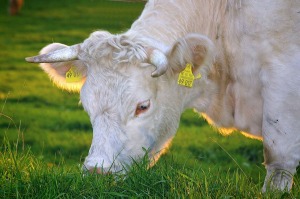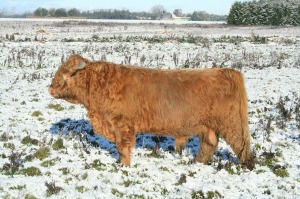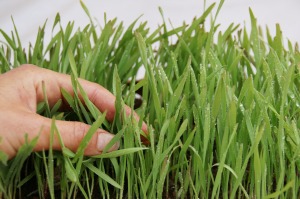Feeding your animals during the cold winter can be a challenging task. In winter, your animals may experience winter stress due to fluctuations in temperature and the extra energy required to move through snow. Your livestock must be kept dry and in good body condition during the winter to reduce stress. It is also important to provide additional food and supplements for them to help them cope with harsh winter weather. They need energy and nutrition to stay warm.
Winter means extra care for your livestock. Usually sheep and alpacas do well during the winter because they are hardy animals with warm fleeces. Additionally, alpacas and sheep don’t need very much food to survive due to their smaller size and efficient digestives systems. However, beef and dairy cattle need adequate nutritious feed during the winter to maintain their meat and dairy production. Finding a cost effective feeding program can be a challenge.
Providing an adequate balanced diet for cattle
 Fluctuation in temperature, feed quality, types of feed and body condition of the animals, all influence the feed intake and health of animals. Quality feed is directly linked to health, and therefore, meat and milk production of the animal. A careful balance is important since over feeding your animals will increase your feeding cost without an equal return on your expenses.
Fluctuation in temperature, feed quality, types of feed and body condition of the animals, all influence the feed intake and health of animals. Quality feed is directly linked to health, and therefore, meat and milk production of the animal. A careful balance is important since over feeding your animals will increase your feeding cost without an equal return on your expenses.
You must provide an adequate and balanced diet for your animals for maximum productivity and cost efficiency.
High quality pasture grass is the best feed for your animals. However, if you don’t have enough grass on the pasture, you must provide additional feed such as hay, and add proteins, supplements and minerals to your feed. This is usually only required if your pasture grass becomes covered with snow or depleted from over grazing.
To provide a balanced diet to your beef and dairy cattle, you may need to add various levels of the following additional supplements to your animal diet.
Key attributes to a balanced animal diet
- Carbohydrates: Carbohydrates are compounds made with carbon, hydrogen and oxygen. They provide lasting energy for animals. 70% of the dry matter in plants contains carbohydrates.
- Fats and oils: Fats and oils provide concentrated energy for animals just like carbohydrates but they have a greater proportion of carbon in them. Seeds and grain based feed have more fat and oil in them.
- Proteins: Proteins are the muscle building elements for animals. Proteins contain amino acids, made up of carbon, hydrogen and nitrogen. All leguminous plants are high in protein making them a vital attribute to a healthy pasture. Growing and lactating animals need more protein in their diet than adult, non-breeding animals which only require enough to maintain their current body condition.
Young growing animals 13 – 14% Lactating animals 13 – 14% Finishing stock (fattening) 10 – 11% Maintaining livestock weight (mature) 8% Table credit: ifestyleblock.co.nz
- Sugars: Sugar provides quickly accessed energy for your livestock. All carbohydrates are converted to sugar before absorption.
- Starch: Starch is stored by plants in their seeds, stems, and roots. Starch is broken down to sugar through the digestive process.
- Vitamins & Minerals: Vitamins are essential in fighting diseases. A lack of vitamins can cause infections and diseases in animals. Supplementing vitamins is important if your feed is of poor quality. Vitamins, especially vitamin D and E are essential. A deficiency in Vitamin D may cause rickets, especially in growing animals. The most prominent symptom is soft bending bones in the legs. A deficiency in vitamin E can result in reproductive challenges and nutritional myopathy (aka white muscle disease) which results in lower quality meat . Minerals such as salt, calcium, sodium, iron, copper, selenium, and zinc are also required in smaller amounts. Although only small amounts of minerals are needed their absence in the diet can result in a weakened immune system and other disease.
- Water: Water is essential for life and all bodily functions. Animals can survive without feed for a long time, but not without water.
Adjust your feed for cold weather
 The amount of supplements and feed your cows will need depends on the weather, pasture condition, physical condition, and age of your animals. If cows are not nursing and are a healthy weight, and your pasture grass is of decent quality, you won’t need more than a salt and mineral supplement and of course, lots of clean fresh water.
The amount of supplements and feed your cows will need depends on the weather, pasture condition, physical condition, and age of your animals. If cows are not nursing and are a healthy weight, and your pasture grass is of decent quality, you won’t need more than a salt and mineral supplement and of course, lots of clean fresh water.If the weather is not conducive for grazing, extra feed in forms of quality hay and supplements should be provided for the animals.
Special care should be given to nursing cows, young and growing calves, or underweight animals. They need extra energy and protein to grow to a healthy weight and produce milk. A layer of body fat will also protect them from cold. Salt is always important as a supplement because this is generally lacking in a pasture based diet.
How to grow your own feed
 You can easily grow a wide variety of juicy and luscious microgreen grasses such as alfalfa, barley, and wheat indoors. They need very little care and water to grow. Microgreens are higher in nutritional value and the balanced nutrition your animals need for normal growth and endurance during the winter.
You can easily grow a wide variety of juicy and luscious microgreen grasses such as alfalfa, barley, and wheat indoors. They need very little care and water to grow. Microgreens are higher in nutritional value and the balanced nutrition your animals need for normal growth and endurance during the winter.Have you tried our DIY systems? If you have, please provide us your feedback on it. If you haven’t tried it, now is the best time to obtain a DIY system and try it yourself. You will get DIY plans for proven livestock feeding systems.
You can also get your Feed in A Box Microgreens (fodder) from us to see how great it is!!
If you would like to learn more about it, please leave your questions or comments in the comment box below or visit our Facebook Page and leave your comment there.
To obtain your DIY system and seeds please contact us at 303-495-3705 or Click here to book a meeting with us.
Source: Sustainable Livestock Nutrition
Related articles & Resources:
- Reduce Winter Stress & Increase Farm Production | Sustainable Livestock Nutrition
- Cattle Management -5 Tips for Winter | Sustainable Livestock Nutrition
- Microgreen – Growing Fodder With DIY Hydroponics System | Sustainable Livestock Nutrition
- Animal & Range Sciences Extension Service
- Winter Cow Care | Health content from BEEF Magazine
- Beef Cow Rations and Winter Feeding Guidelines – Agriculture
- Livestock Care & Forage Management for Fall & Winter | Sustainable Livestock Nutrition




I have just heard on the grapevine that the catlte market have been refused planning for the proposed site on the outskirts of town. Lets hope they stay put now.
Thanks for sharing
It makes sense that you can increase milk and meat production by giving your livestock high-quality feed. My uncle recently purchased some cattle so start a farm, but he has noticed that the females are not producing a lot of milk and appear to be skinnier than when he first bought them. I’ll let him know that they need to be provided with nutritious food in order to produce plenty of milk.